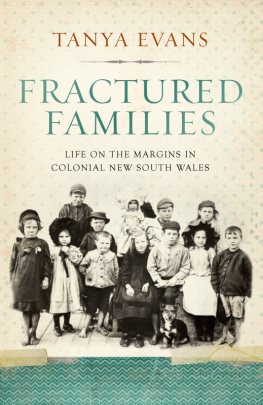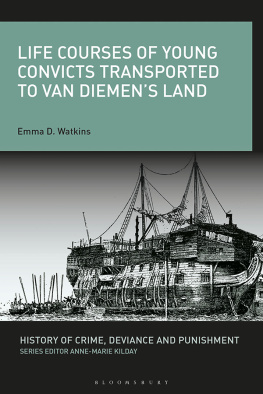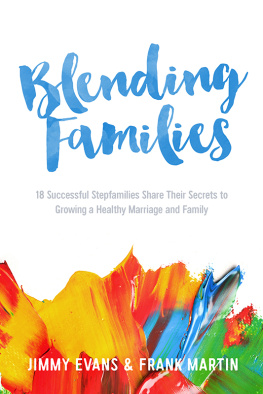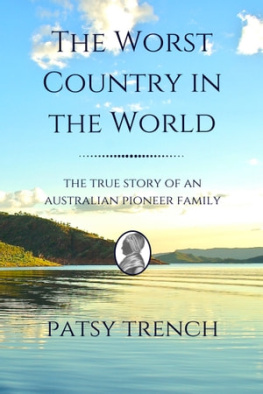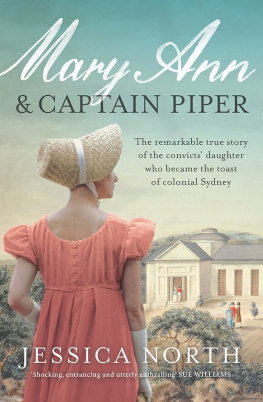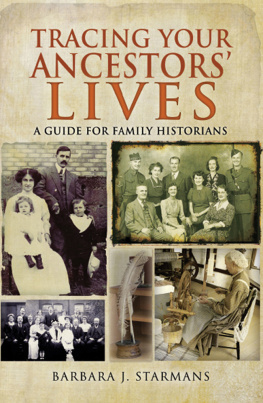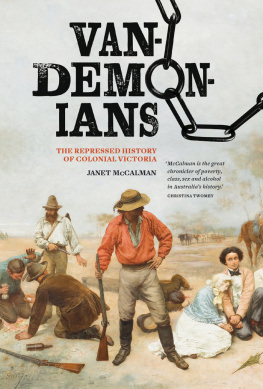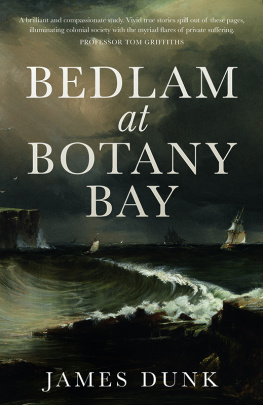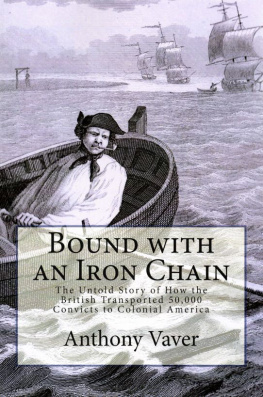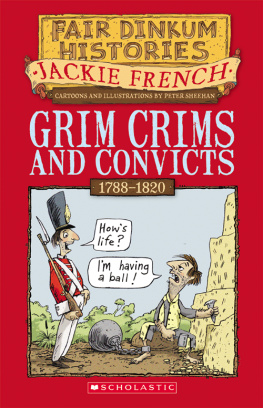FRACTURED FAMILIES
TANYA EVANS is a Senior Lecturer in the Department of Modern History at Macquarie University. She has worked as a historical consultant for charities and non-governmental organisations and for numerous television production companies in Britain and Australia, including the Australian series of Who Do You Think You Are? She is the co-author, with Pat Thane, of Sinners? Scroungers? Saints? Unmarried Motherhood in Twentiethcentury England (2012), and the author of Unfortunate Objects: Lone Mothers in Eighteenth-century
London (2005).
FRACTURED
FAMILIES
LIFE ON THE MARGINS IN
COLONIAL NEW SOUTH WALES
TANYA EVANS

A UNSW Press book
Published by
NewSouth Publishing
University of New South Wales Press Ltd
University of New South Wales
Sydney NSW 2052
AUSTRALIA
newsouthpublishing.com
Tanya Evans 2015
First published 2015
10 9 8 7 6 5 4 3 2 1
This book is copyright. Apart from any fair dealing for the purpose of private study, research, criticism or review, as permitted under the Copyright Act, no part of this book may be reproduced by any process without written permission. Inquiries should be addressed to the publisher.
National Library of Australia Cataloguing-in-Publication entry
Creator: Evans, Tanya, 1972 author.
Title: Fractured families: life on the margins in colonial New South Wales/
Tanya Evans
ISBN: 9781742232577 (paperback)
9781742247267 (ePDF)
9781742241982 (ePub/Kindle)
Subjects: Frontier and pioneer life New South Wales.
Pioneers New South Wales Biography
New South Wales Social conditions 17881900.
New South Wales Economic conditions 17881900.
Dewey Number: 994.402
Design Di Quick
Cover design Luke Causby, Blue Cork
Cover image Children in the care of the Benevolent Society (Source: The Benevolent Society)
Printer Griffin
All reasonable efforts were taken to obtain permission to use copyright material reproduced in this book, but in some cases copyright could not be traced. The author welcomes information in this regard.
This book is printed on paper using fibre supplied from plantation or sustainably managed forests.

Contents
Acknowledgments
IN LOTS of ways, this is a book with many authors. My research and writing has been dependent upon many people sharing their knowledge and diverse areas of expertise. I am very grateful to them all. Most importantly, I need to thank the many family historians who shared the fruits of their labour and details on their practice of family history with me: Max Carrick, Joye Walsh, Julie Poulter, Liz Rose, Les Ridgeway, Glynda Nolan, Rosemary Joseph, Dianne Rayner, Alan and Jan Read, Anne Coote, Jeff White, Warwick McNamara, Sue Millwood, Karen Rodgers, Betty Calloway, Nicole Don, Kath McKay, Paul Robinson and Anne Wilmshurst.
For putting me in touch with most of them, I thank Martyn Killion and Heather Garnsey. They really have gone above and beyond the call of duty for me over the last few years. It is a delight to meet people with such passion for family history and who volunteer so much of their free time to help others learn more about their genealogy. I also want to thank staff at The Benevolent Society for their support while working on the organisations history, especially Yvonne Stewart, who put enormous effort into my search for the right images. Thanks too to staff at the State Library of New South Wales, where most of the records of The Benevolent Society are stored.
In the United Kingdom, I have benefited from conversations about material culture and the history of the family with Joanne Bailey and Karen Harvey. The archivists and museum practitioners who shared their in-depth knowledge of their collections include staff at Morling College and the National Museum of Australia, Megan Martin at Sydney Living Museums, Deborah Tout Smith at Museum Victoria, and Lindie Ward and Glynis Jones at the Powerhouse Museum. I have learned a lot from staff at Artemis producing Who Do You Think You Are?, especially Celia Tait and Diana Pepper. I am very grateful to Phillipa McGuinness at UNSW Press and I want to thank the wonderful team there, including Heather Cam, Uthpala Gunethilake and Tricia Dearborn. They really were a joy to work with.
For funding my research I thank the British Academy for supporting a trip to Australia from London in 2003 to work on the orphan schools. This formed the foundation of a much larger fellowship granted by Macquarie University from 2008 to 2011, for which I remain eternally grateful. Macquarie University also gave me a Safety Net Grant and a New Staff Grant, which enabled me to extend my research and to employ the wonderful Patricia Curthoys as a research officer on the project. I thank Patricia for being my moral compass throughout the project. Macquarie University employed me as a permanent lecturer from 2011, which enabled me to develop the project alongside teaching in Australian and public history. I am very grateful to Mary Spongberg and John Simons for their support over many years.
My colleagues and friends at Macquarie University have made significant contributions through their comments on parts of this work. They include Jill Roe, Leigh Boucher, Kate Fullagar, Nic Baker, Mark Hearn, Robert Reynolds, Hsu Ming Teo, Michelle Arrow, Rebecca Jennings, Shirleene Robinson, Michael Roberts and Alison Holland. I need to thank Margaret Sampson most of all, for reading and commenting on the entire draft, and much else besides. I would be lost without you, Margaret. I am grateful to Patricia Curthoys, Dianne Finnegan, Dennis Shepherd, Sophia Erikson and Mandy Kretschmar for their research assistance. I also want to thank Paul Irish, Mark Dunn and Michael Bennett for advice and information on Aboriginal history.
This book could not have been produced without the publication subvention provided by the City of Sydney. I thank the Council and Dr Lisa Murray, in particular, for their support. Historians of Sydney are blessed to have a Council so passionate about local history.
This, my third book on the history of the family, is written for my own family. Will, Lara and Mike were occasionally dragged away from the beach, where we seem to spend so much of our spare time these days, and forced to do history at museums, galleries, archives and elsewhere over weekends and school holidays as I completed this project. I hope I havent turned them against history forever. I want to thank Michael for his love and forbearance over the past twenty-two years, and the sacrifices he made when we moved to Australia.
Prologue
WHY DO the life stories of some men and women in the past come to our attention, while others do not? Why do we know much more about Philip Gidley and Anna Josepha King than about Peggy and Jonathan Goldspink, whose lives are detailed in this book? Since the 1960s, historians from below, and the new social historians who followed them, have exhorted us to turn our historical gaze from the elite to more marginal members of society. To some extent, biographical studies have broadened their range to include the lowly among the great and the good.
In this book I bring together the histories of diverse social groups, the powerful and the poor. I merge family history, biography and life-writing techniques with local, urban, colonial and post-colonial history, locating individual lives within their larger historical contexts. This work has firm foundations in a rich scholarship on convict lives, the new biography, microhistory and new social history.relations at the heart of memorialisation. I uncover the life stories of men and women at different ends of the social spectrum from the late 18th century to the turn of the 20th and ask how, why and in what ways these varied individuals are remembered in Australia today. These lives are refracted through a history of The Benevolent Society, Australias oldest surviving charity, established in 1813.
Next page
